7 Easy Ways To Accelerate The Composting Process From A Professional Horticulturist


Elizabeth is a Permaculture Garden Designer, Sustainability Consultant and Professional Writer, working as an advocate for positive change. She graduated from the University of St. Andrews with an MA in English and Philosophy and obtained a Diploma in Applied Permaculture Design from the Permaculture Association.
Reviewed By DAN ORI

Dan has over 27 years’ under his belt caring for plants and gardens. Working as a Horticultural Instructor and Consultant, he draws on a diverse range of experience that includes working as a Head Gardener, Tree Surgeon, Garden Centre Trouble Shooter, and writer of academic papers. Dan has a Level 3 Diploma in Horticulture and is currently a candidate for the RHS’s most prestigious award – The Master of Horticulture.
Creating your own compost at home is one of the very best things that you can do to garden in a more sustainable way and maintain your garden long-term.
It is not difficult to compost organic materials, as this is a natural process that can take place without our intervention.
Composting happens naturally around us in our gardens all the time, but to speed up the process, it can often be helpful to take things into our own hands.
There are numerous different ways to make compost and some take a lot longer than others.
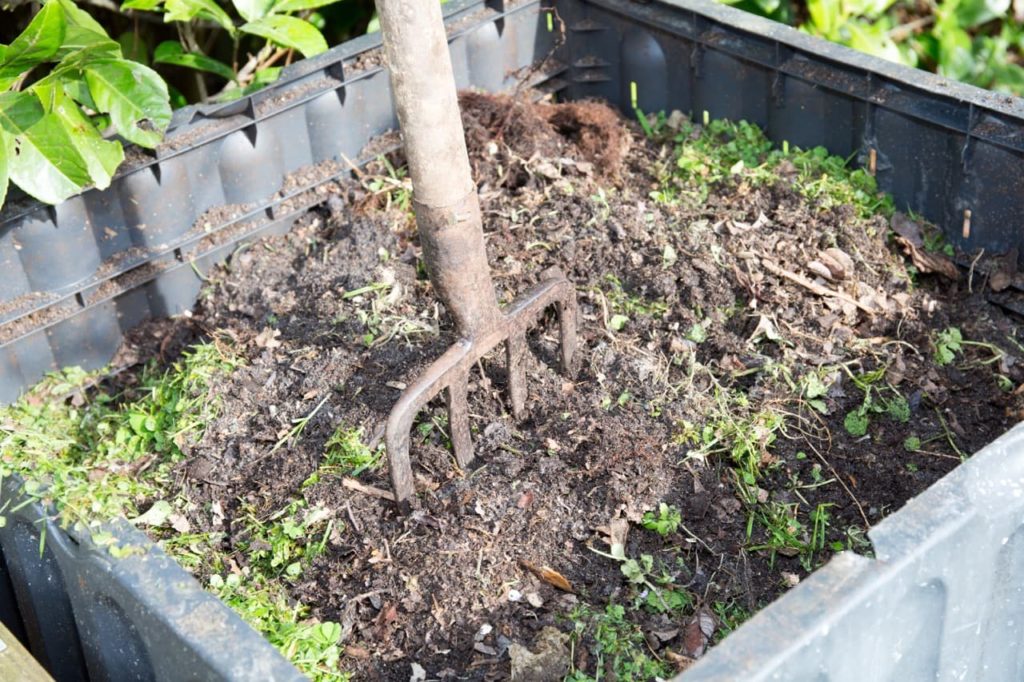
Often, especially where space is limited, it can be useful to understand the fastest methods of compost creation and how to accelerate the compost-making process.
If you are new to the world of composting, you should understand that there are a number of different ways to accelerate compost creation and speed up the process, including:
- Add more nitrogen-rich materials.
- Ensure the right moisture levels are maintained in the compost.
- Shred materials into smaller parts prior to composting.
- Improve aeration within the compost mix.
- Heat up the compost (hot composting).
- Enlist the help of worms in your composting system.
- Adding additional ingredients (such as biochar or ash) to the compost mix.
Read on for a more detailed explanation of each of the above.
1) Manipulate The Carbon-Nitrogen Balance
One important thing to think about if you want to accelerate compost creation is the balance of carbon-rich to nitrogen-rich materials in your compost heap or bin.
The ratio of carbon to nitrogen that you want will depend on the composting method that you have selected and your ultimate goals.1Vinje, E. (2023, January 10). Carbon-to-Nitrogen Ratio. Planet Natural. Retrieved May 10, 2023, from https://www.planetnatural.com/composting-101/making/c-n-ratio/
However, it is important to understand the impact that this ratio has on the speed at which materials in the compost break down, as well as the impact it has on the finished product.
Often, a failure to balance the carbon-rich ‘brown’ and nitrogen-rich ‘green’ materials within a composting system is the reason for the problems that it has.
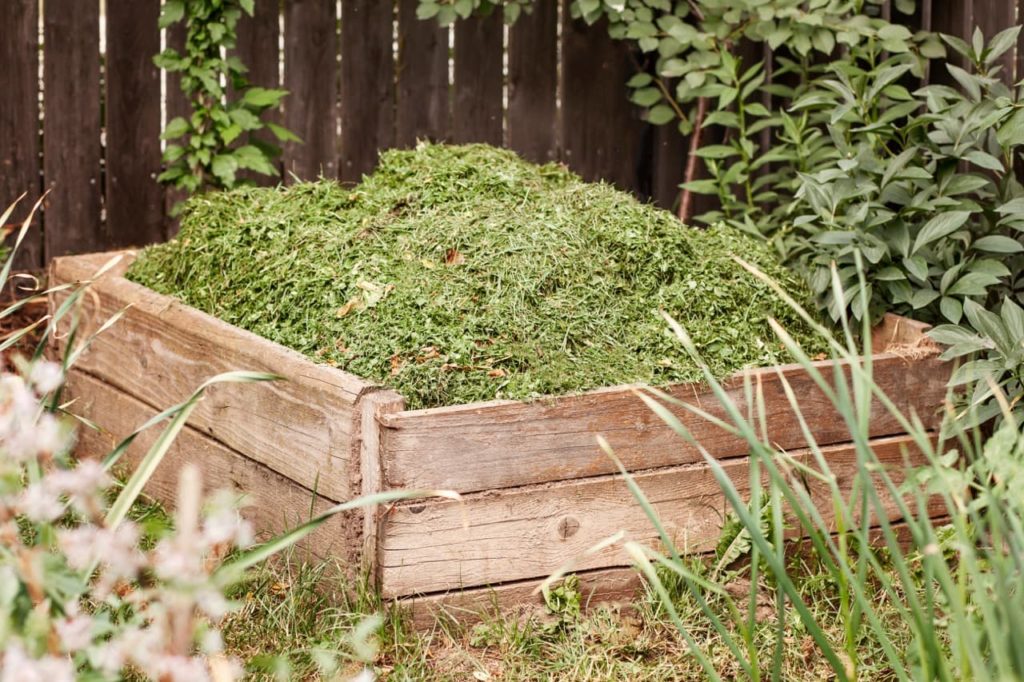
If a composting system has too much carbon and too little nitrogen, it may often slow down considerably.
So, adding more nitrogen-rich materials like manure, grass clippings or other green leafy plant matter can accelerate the process once more.
“It is more likely that the average gardener adds almost entirely green to their compost in the form of grass clippings, kitchen waste, and green plant matter,” Horticultural Expert Dan Ori shares.
“This almost entirely green mix is nitrogen-rich, but it just pickles rather than composts, creating a smelly unusable mess.”
So what ratio should you use? Dan suggests, for a standard 1m by 1m compost heap or bin I would mix two parts brown to one part green, turning it every 3 months into another heap, after 12-18 months you should have good quality garden compost you can use.
“If you have a small compost bin you could move to a faster mix that might get you something usable as mulch in 6-12 months, my faster mix would be one part brown to one part green,” he says.
“Just be aware you often trade the quality of usable compost when you increase the nitrogen (green).
“If you use one compost bin I advise getting at least one more so when one is full you can empty it into the other, this turning will help speed up the composting process and you will have an empty compost bin to start again.”
2) Ensure The Moisture Level Is Right
Another important thing to think about in compost creation is that microbial life within the compost needs moisture to survive.
In addition to this, when microbial life suffers, the process of decomposition in a composting system will slow down or cease altogether.2Wyatt, G. (2023, March 15). Composting for Beginners: Dos and Don’ts (2023). Subpod US. Retrieved May 10, 2023, from https://subpod.com/pages/composting-for-beginners
It is important to keep compost within the Goldilocks zone when it comes to moisture within a compost heap or bin.
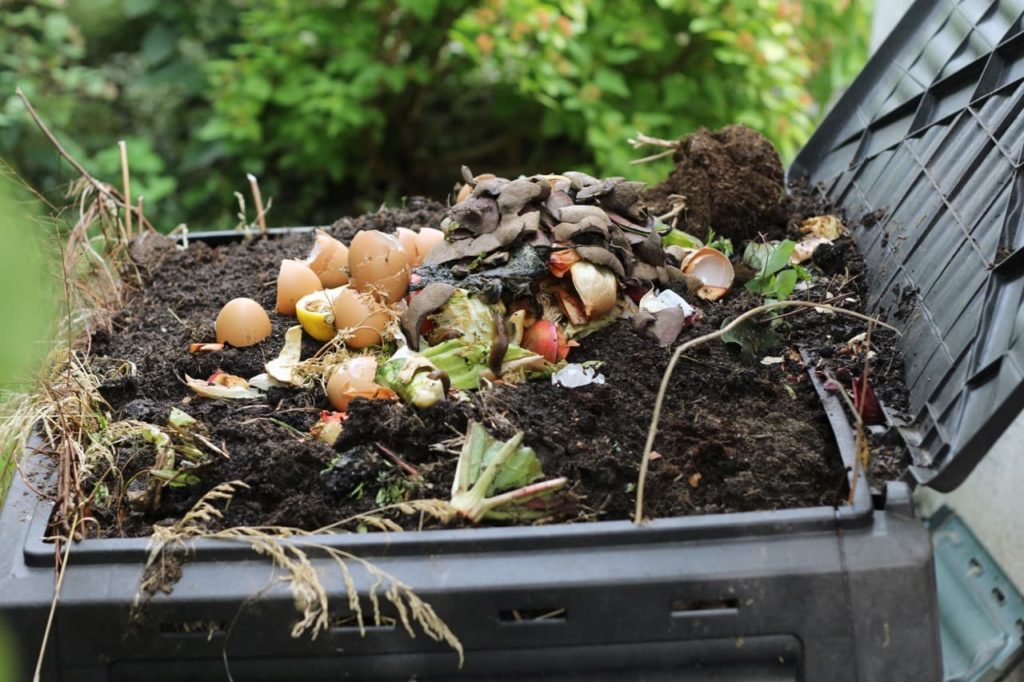
Too wet, and the compost can become compacted and lack aeration.
Too dry and the process may slow because the life within the compost that is essential to break down the materials may not be present to do its job.
If a compost heap is too dry, watering it may help to accelerate compost creation once more.
3) Pre-Shred Compost Materials
On the whole, larger pieces within a composting system will break down more slowly than smaller pieces.
Often, to accelerate the process, all we need to do is think about the size of the pieces that we place into our composting systems in the first place.
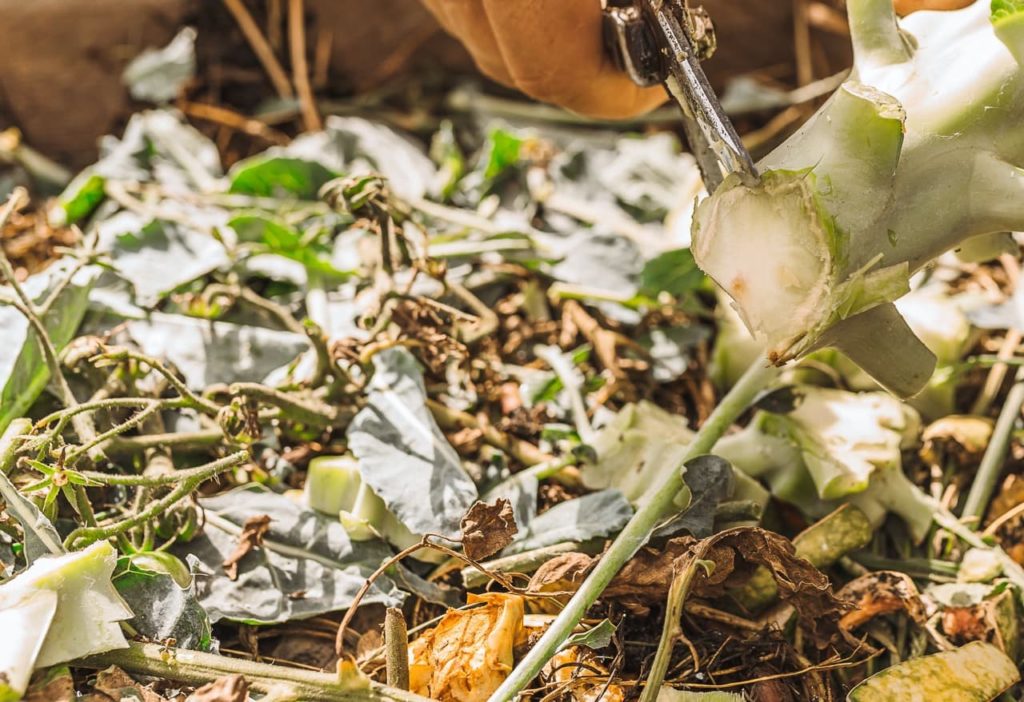
Rather than placing longer stems and branches onto a heap or into a composting container, you can shred that material first so that the pieces break down into a finished compost far more quickly.
With just a little more work upfront, you could end up with a useful and usable compost far more quickly than you otherwise would have done.
4) Add Air Spaces & Improve Aeration
One other very important thing to think about when trying to create compost as quickly as possible is how much oxygen there is within the compost heap or bin.
Air spaces are essential within any aerobic composting system, in which we rely on microbes for decomposition that require oxygen to survive.3Trautmann, N. (n.d.). Compost Physics. Cornell University. Retrieved May 10, 2023, from https://compost.css.cornell.edu/physics.html
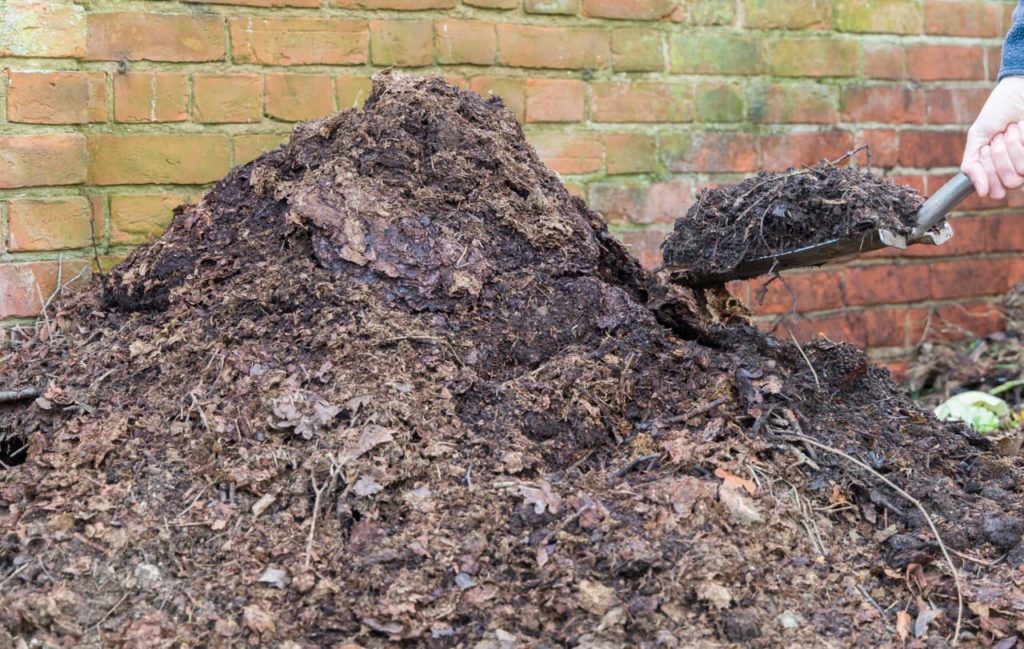
Placing bulking agents like sticks, twigs or straw into the compost helps to ensure that there are air pockets so that the life within it can thrive.
To improve aeration and speed up decomposition in many systems, you should also turn the compost regularly in order to ensure that there is plenty of oxygen in the mix.
This is where tools like compost aerators and tumblers come in, which can be used to accelerate compost creation.
5) Increase Temperatures For A Hot Composting System
One of the key ways to accelerate compost formation is to increase the temperatures of the mix.
When you aim for higher temperatures within a composting system, this is called hot composting.
Hot composting involves composting at temperatures at least 60°C.4Heap Temperature and Home Composting. (n.d.). Carry on Composting. Retrieved May 10, 2023, from https://www.carryoncomposting.com/416920215.html
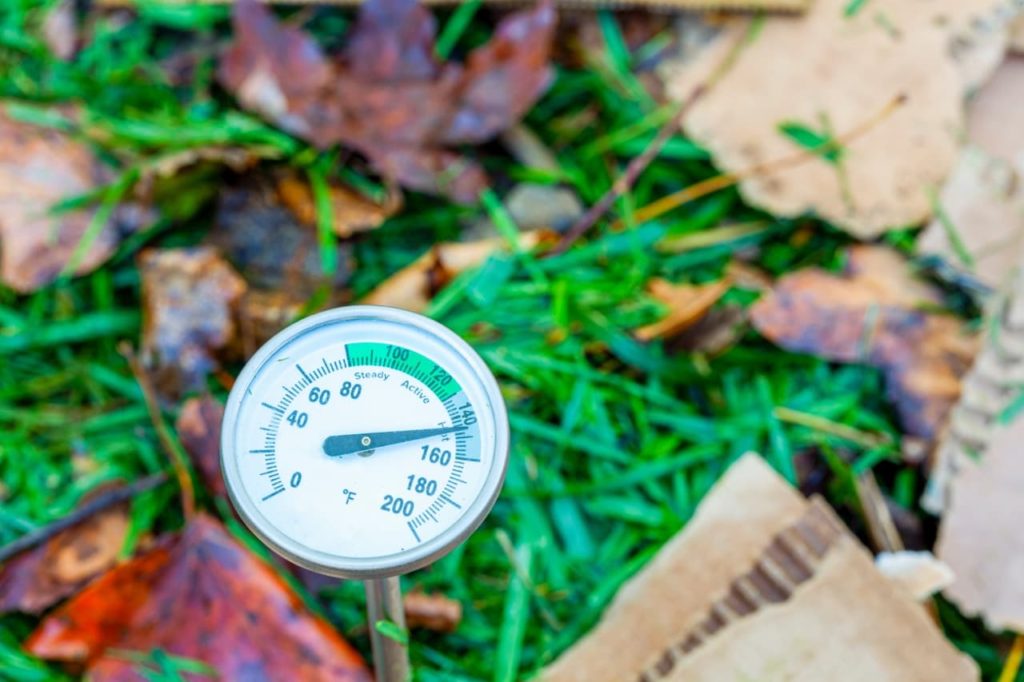
The greater temperatures within a hot composting setup mean that materials break down in far less time.
Making sure that your heap or your bin is the right size and in the right place, as well as adding the right mix of materials, is vital to achieving these temperatures.
Hot composting requires more consideration and effort compared with other, simpler composting methods, but the benefits that it can bring, accelerating the process and the general quality of the compost provided, can make all of that thought and effort worth it.
6) Take Up Vermicomposting
Interestingly, you could consider enlisting the aid of special composting worms to speed up the composting process and create an excellent end product.
Vermicomposting involves using composting worms within a bin or wormery system in order to break down materials more quickly and to create worm castings and worm tea which are incredibly good for your garden.5Worm composting / RHS Gardening. (n.d.). Royal Horticultural Society. Retrieved May 10, 2023, from https://www.rhs.org.uk/soil-composts-mulches/worm-composting
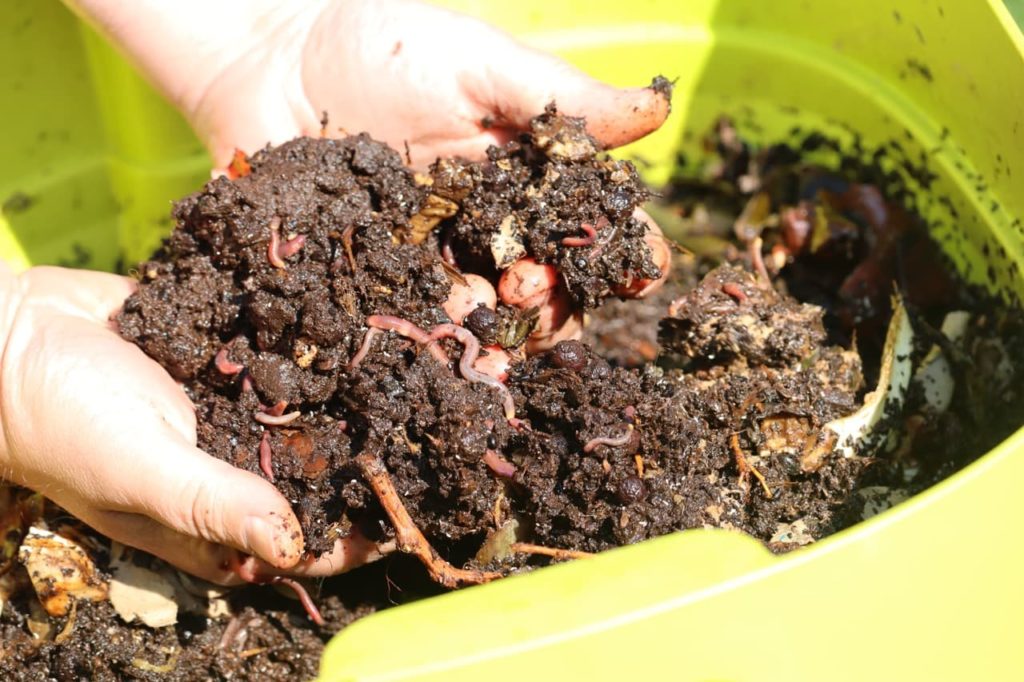
As the worms pass through the mix they aerate it, which, as discussed above, can speed up the process.
Also, as they digest the food scraps that you add for them, they speed up the decomposition within the mix.
7) Add Certain Ingredients To Speed Decomposition
The methods discussed above are the main ways to try to accelerate compost creation.
However, there are also other ways that scientists have shown that composting can be sped up.
Adding certain specific ingredients to a compost heap or bin in moderation has been shown to speed up the process.
For example, adding wood ash in moderation (but certainly not excessively) can improve the function and speed of the system as a whole.6Jordan, C. (2023, February 8). How to Use Ashes in Compost. WebMD. Retrieved May 10, 2023, from https://www.webmd.com/balance/how-to-use-ashes-compost
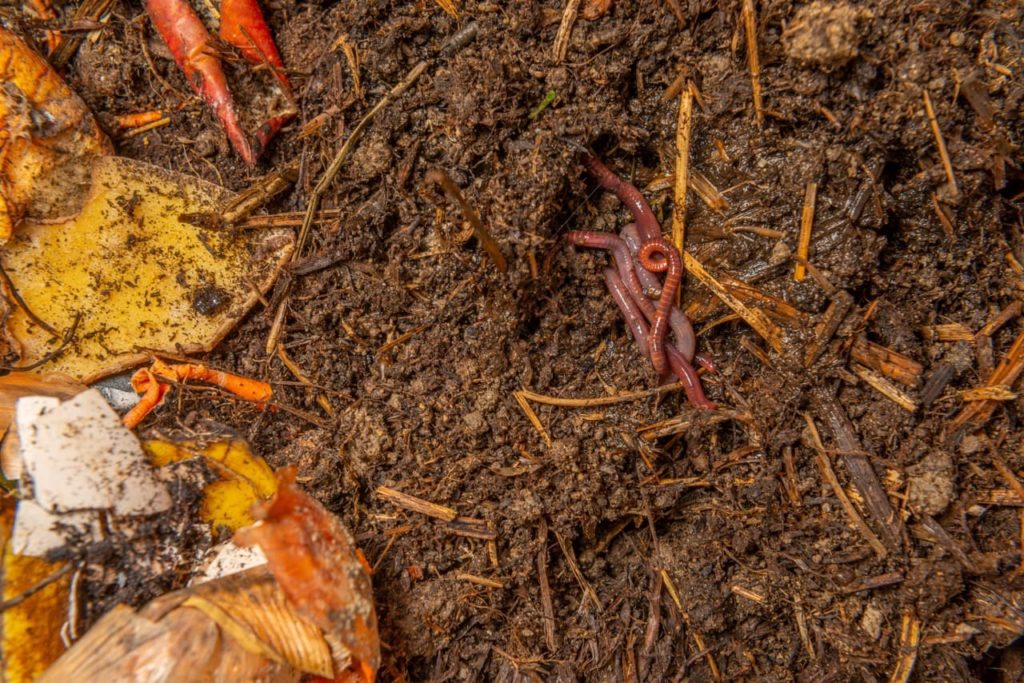
Likewise, adding small quantities of woody biochar to the composting system has been shown to accelerate the process.7Teodoro, M., Trakal, L., Gallagher, B., Šimek, P., Soudek, P., Pohořelý, M., Beesley, L., Jačka, L., Kovář, M., Seyedsadr, S., & Mohan, D. (2020, March 1). Application of co-composted biochar significantly improved plant-growth relevant physical/chemical properties of a metal contaminated soil. Chemosphere. Retrieved May 10, 2023, from https://doi.org/10.1016/j.chemosphere.2019.125255
Caution is required when adding these elements and there is a lot more complexity in this arena to navigate, but you can fine-tune a composting system by adding certain elements to increase the speed of decomposition.
However, beginners should always focus first on the key elements of the overall balance, moisture, aeration and temperatures and the roles these play in accelerating compost before they start experimenting further with creating the perfect compost for their needs.
This caution is echoed by gardening expert Dan Ori:
“As there has been no scientific study that I am aware into the mixing of wood ash and biochar into compost heaps, I would avoid attempting this as you could easily do more harm than good.
“However, the use of wood ash and biochar directly on the garden instead has lots of studies prescribing when and when not to use, so looking further into this may be of value to you.”
Focussing on these core things can help to accelerate compost creation while still getting great results from whichever system you choose.
References
- 1Vinje, E. (2023, January 10). Carbon-to-Nitrogen Ratio. Planet Natural. Retrieved May 10, 2023, from https://www.planetnatural.com/composting-101/making/c-n-ratio/
- 2Wyatt, G. (2023, March 15). Composting for Beginners: Dos and Don’ts (2023). Subpod US. Retrieved May 10, 2023, from https://subpod.com/pages/composting-for-beginners
- 3Trautmann, N. (n.d.). Compost Physics. Cornell University. Retrieved May 10, 2023, from https://compost.css.cornell.edu/physics.html
- 4Heap Temperature and Home Composting. (n.d.). Carry on Composting. Retrieved May 10, 2023, from https://www.carryoncomposting.com/416920215.html
- 5Worm composting / RHS Gardening. (n.d.). Royal Horticultural Society. Retrieved May 10, 2023, from https://www.rhs.org.uk/soil-composts-mulches/worm-composting
- 6Jordan, C. (2023, February 8). How to Use Ashes in Compost. WebMD. Retrieved May 10, 2023, from https://www.webmd.com/balance/how-to-use-ashes-compost
- 7Teodoro, M., Trakal, L., Gallagher, B., Šimek, P., Soudek, P., Pohořelý, M., Beesley, L., Jačka, L., Kovář, M., Seyedsadr, S., & Mohan, D. (2020, March 1). Application of co-composted biochar significantly improved plant-growth relevant physical/chemical properties of a metal contaminated soil. Chemosphere. Retrieved May 10, 2023, from https://doi.org/10.1016/j.chemosphere.2019.125255
